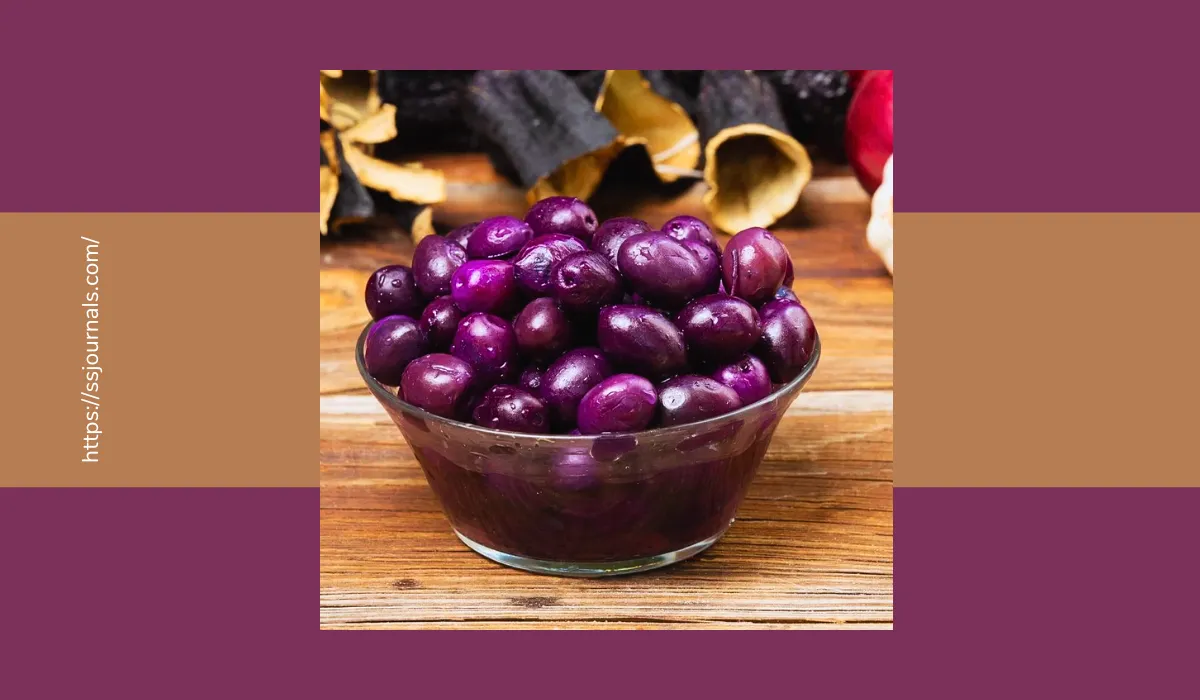Purple olives, also known as Kalamata olives, are a popular variety of olives known for their rich flavor and distinctive color. In recent years, there has been growing interest in their health benefits and nutritional value.
Kalamata olives are packed with heart-healthy fats, antioxidants, and anti-inflammatory compounds that can positively benefit overall health and well-being.
In this article, we’ll delve deeper into why purple Kalamata olives are considered a nutritious fruit, explore some of the ways they may support better health, and compare their nutrients and benefits to black olives.
We’ll also provide tips for enjoying purple olives as part of a healthy, balanced Mediterranean-style diet. By the end, you’ll understand why colorful Kalamata and black olives deserve a regular place in your meals and snacks.
Nutrition Profile – What Makes Purple Olives Healthy?

Kalamata olives provide a concentrated source of several beneficial nutrients that serve vital roles in the body:
- Healthy Fats – Primarily monounsaturated fatty acids like oleic acid which support heart health.
- Antioxidants – Vitamin E, polyphenols, and flavonoids fight free radical damage.
- Anti-inflammatory compounds – Help lower systemic inflammation.
- Vitamin K – Supports bone and heart health.
- Iron – Important for blood and muscle health.
- Copper – Boosts nerve and immune health.
- Fiber – Improves digestion and gut health.
The enriching blend of vitamins, minerals, antioxidants, and anti-inflammatory fatty acids contributes to the many touted health benefits of purple olives.
Health Benefits of Kalamata Olives
1. Heart Health
The oleic acid in Kalamata olives may help lower LDL cholesterol while raising HDL, decreasing heart disease risk.
2. Cancer Prevention
Antioxidants in Kalamata olives neutralize free radicals and exhibit anti-proliferative effects on cancer cells.
3. Anti-inflammatory effects
Kalamata olives provide compounds that can alleviate inflammatory conditions like arthritis.
4. Gut health
Fiber, anti-inflammatory fats, and antioxidants support overall digestive health.
5. Bone health
Vitamins and minerals in purple olives, like calcium, magnesium, and vitamin K play central roles in building and maintaining bone mineral density.
How Do Purple Olives Compare to Black Olives?
Black and purple ripe olives offer similar nutritional assets and health benefits. Most differences come down to variations in their cultivars, growing conditions, and curing methods which impact appearance, texture, flavor, and exact nutrient composition.
Here’s a quick nutshell comparison:
- Antioxidants – Black olives tend to be very high in antioxidants and healthy fats as well.
- Vitamin E – Purple Kalamata olives contain at least 1.5 times more vitamin E than many black olive varieties.
- Iron – Black olives have more iron compared to purple Kalamatas.
- Flavor – Purple olives feature a complex, fruity flavor while black olives offer a mild, salty taste.
Incorporating Purple Olives into Your Diet
Take advantage of the stellar nutrient profile offered by Kalamata and other brine-cured black olives by enjoying them often as part of an olive-rich Mediterranean diet.
- Toss sliced or chopped purple olives into salads, grain bowls, pasta dishes
- Add olive tapenade to sandwiches, wraps, bruschetta
- Mix olives into homemade hummus, salsa, pizza sauce
- Create olive oil and vinegar drizzle with minced olives
- Bake olives into breads, muffins, tarts
- Skewer as a party appetizer
Conclusion
In conclusion, all olives, but especially antioxidant-rich Kalamata and black olives, deserve a regular place in a healthy diet due to their stellar nutritional profile and research-backed health benefits. By consuming olives frequently, you can take advantage of their heart, brain, antioxidant, and anti-inflammatory benefits.
Out of all varieties, purple Kalamata olives stand out for their intensely smooth, fruity flavor and a bountiful supply of vitamin E – two times higher than many black olives.
So if you are looking to maximize flavonoids and Vitamin E for antioxidant advantages, Kalamata and other purple ripe olives are the way to go. Ultimately though, all forms of cured olives confer health perks when enjoyed in balance as part of an olive-heavy Mediterranean eating pattern.
Will you start consuming delicious Kalamata or other brine-cured black olives more often now that you know about their many nutritional and health advantages? Which way of eating purple olives sounds tastiest to you – on salads, in tapenade, or baked into hearty bread? What variety of olive is your favorite to enjoy and do you notice any health perks from adding these tasty fruits to meals or snacks? Let me know in the comments!
FAQs
Yes, Kalamata olives are often considered healthier than unripe green olives. They contain higher antioxidant levels which confer health protective effects. But all olive varieties have benefits.
While olives offer health advantages, it’s best to enjoy them in moderation as part of a varied diet due to their high sodium content. Consuming over 2 cups of olives in a day could result in excess sodium intake.
Potential side effects of overconsuming olives may include nausea, diarrhea, and muscle cramps. It can also negatively impact heart health due to their high sodium levels.
No, Kalamata olives contain monounsaturated fats which may help lower LDL cholesterol. So in moderation, olives are part of a heart-healthy eating pattern.
After opening, Kalamata olives packed in brine can last 1 month refrigerated. Discard if mold develops. For maximum freshness and flavor, consume within 1-2 weeks of opening.

